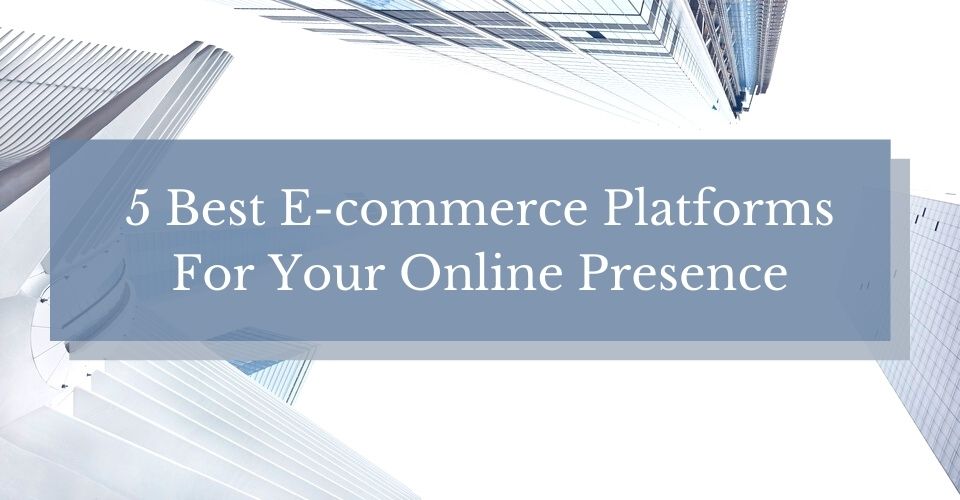Building a successful omnichannel business starts with choosing the right e-commerce platform. However, it’s kind of a tough decision since there are so many platforms in the market. Today, we’re going to help you choose the right one for your business with our list of 5 best e-commerce platforms based on their pros & cons, pricing plans, and customer support service.
Overview
Magento

First off, Magento! This is one of the most popular e-commerce platforms as they power more than 250,000 merchants worldwide. Magento is best for small-to-medium businesses with established demand, manpower, and skill to build their store website. It empowers users to create a unique and engaging shopping experience.
Pros
- Over 5,000 extensions available
- Seamless user experience
- SEO-friendly
- Very scalable and can grow as your business does
- No transaction fees
- Offer more than 100 free themes for a customized experience
Cons
- A complex system to learn that requires advanced development skills
- Larger budget than other competitors
- Longer development time
- Need a hosting provider and domain name since Magento is self-hosted
Pricing
While Magento Open Source is free of charge, Magento Commerce is a paid enterprise-level solution. Pricing starts at $1,600/month and can go up to $50,000 annually. Unfortunately, there’s no trial for Magento.
Customer support
Magento doesn’t offer 24/7 support as business owners are expected to develop the site on their own with handy resources and guides.
Shopify

Shopify is the cloud-based e-commerce solution in the retail industry with more than 1 million businesses across 175 countries. It is one of the best e-commerce platforms for different sizes of businesses that need a helping hand when setting up their stores.
Pros
- Easy to use, beginner-friendly
- More than 100 high-quality designed and customized themes
- Available both in online and offline mode
- Accept multiple payment options
- Allow multi-channel and social selling
- Cooperate with many certified partners
Cons
- Unable to customize the checkout process
- Become costly when adding up apps
- Users are charged an additional fee on each transaction if they don’t use Shopify Payment
Pricing
The pricing plan comes with 3 levels: Basic Shopify, Shopify, Advanced Shopify starting at $29/month. The best thing is that Shopify offers a 14-day free trial with no credit card required.
Customer support
Shopify’s supporting team is a huge plus when choosing a perfect e-commerce platform. There is 24-hour chat and phone support whenever users need help. Also, community forums and the online help center are there to assist you.
►►►► Please visit our products: digital banking, situation analysis, Shopify markets, supply chain operations management, fintech ai, Multi Store POS, Woocommerce POS, Mobile POS, White label POS, Reseller POS, Beauty Supply Store POS, POS System for Retail and Vape shop POS
BigCommerce

BigCommerce is definitely one of the biggest players in the area with its unique features. Founded in 2009, BigCommerce has since generated over $17 billion in merchant sales. It is suitable for large and fast-growing businesses that require a lot from their e-commerce platform with large product catalogs.
Pros
- No hosting, update, or maintenance costs
- No transaction fees
- SEO-friendly
- Easy to set up and develop
- Fantastic theme designs
- Excels in multi-channel selling
Cons
- No 1-click selling
- Lack of free and affordable themes
- Expensive for high volume stores
Pricing
There are 3 pricing plans: Standard, Plus, Pro with a price range from $29.95 to $299.95 per month. If you are an enterprise, you can contact BigCommerce’s sales team for custom pricing. A free 15-day trial is also available.
Customer support
BigCommerce offers 24/7 support via live chat, email, and phone.
WooCommerce

WooCommerce is a worth mentioning option when talking about the best e-commerce platforms. The platform accounts for 18% of the e-commerce market and powers over 28.19% of all online stores in 2020. Used along with WordPress as a plugin, WooCommerce enables your website to have a very powerful capability of online sales.
Pros
- Offer various plugins
- A large number of plugins and extensions available
- Easy to use if users are familiar with WordPress
- Allow many types of payments
- Various free and paid pre-designed themes & shop styles available
- Total control over your data
Cons
- Initial setup is quite complicated for users without much experience
- No central support as the support is provided
- Costs for third-party sites (hosting, SSL certificate, and domain costs)
- Limited file storage by your web host
Pricing
WooCommerce is free to download but the hosting cost may go up to $100/year.
Customer support
WooCommerce offers live chat support within 24 hours. Online help guides and community forums are also available.
Wix eCommerce

Wix is an all-around e-commerce platform with excellent e-commerce capabilities. It is a cloud-based website provider that allows you to create online stores with drag-and-drop tools. The platform has 154 million users, 4.3 million of which are premium ones. Wix is the best fit for new online stores with affordable pricing and a simple setup.
Pros
- Offer numerous free themes
- Simple to use and set up
- Intuitive and user-friendly interface
Cons
- Difficult to fully customize the template
- Lack of upselling features and advanced automation
- Bad SEO reputation
Pricing
Business owners can choose one of three pricing options: Basic, Unlimited, and VIP, starting from $17/month.
Customer support
Wix provides responsive support for different customer needs via phone. Users can open a ticket if they don’t want to use the mobile phone. A detailed knowledge base is also provided for self-help preference.
Final words
Each e-commerce platform offers distinct features and pricing plans. Based on the pros and cons of all 5 e-commerce platforms above, we hope this article will help you choose the best e-commerce platform and expand the unlimited possibilities of your business.
Visit our blog for more in-depth information!
